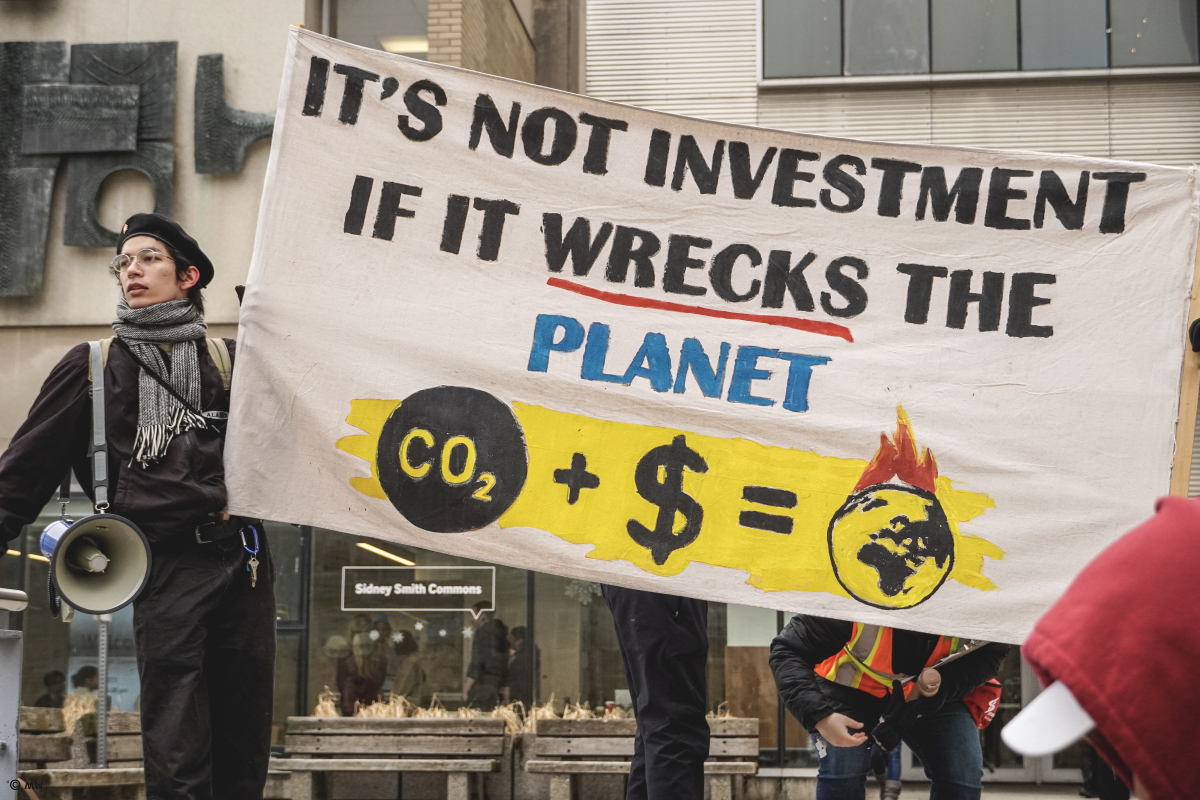Support strong Canadian climate journalism for 2025
Students at the University of Toronto’s affiliate colleges and York University are ramping up pressure on their schools to divest from fossil fuels.
The University of Toronto announced it would divest its endowment in October 2021. Now, students are demanding the university’s federated schools, like Victoria University and Trinity College, also commit to moving their investments out of fossil fuels, which causes pollution that is one of the main drivers of climate change. Less than an hour’s drive north, students at York University want their school to follow suit. Both groups want their universities to be transparent about their investments.
Boomba Nishikawa, a member of Climate Justice University of Toronto and a student at Victoria University and Trinity College, said since 2018, students have been asking for Victoria University to divest its endowment, which was valued at just under $524 million in 2021.
“Student money is what's contributing to this endowment. Alumni money is what's contributing to this endowment,” Nishikawa said, “so we should have some agency in where the money goes.”
On Feb. 9, Nishikawa and other students interrupted their university’s board of regents meeting to demand divestment. On Friday, students also demonstrated on campus to pressure Victoria University to divest.
In an email to Canada’s National Observer, a spokesperson for Victoria University said its investments are guided by environmental, social and governance factors (ESG), and the school is set to review its guidelines in the “coming months.” But Nishikawa said it’s hard to find out if the university’s ESG guidelines are actually leading to cleaner investments.
“At the bare minimum, we need to see an increase of transparency so students are able to know where their funds are going,” Nishikawa said.
Across the city, students at York University are also putting pressure on their school to commit to clean investments. On Jan. 31, a group of faculty members and students called York University Fossil Free met with university president Rhonda Lenton to discuss divesting its pension plan, valued at about $2.99 billion last August, and its endowment fund, valued last April at about $550 million.
Peri Dworatzek and Amanda Rooney, both master’s students at York University and members of York University Fossil Free, say they want their school to make an explicit commitment to divesting and decarbonizing its portfolio by investing in businesses that help the world mitigate and adapt to climate change.
“York has a big claim to be aiming to meet the United Nations’ sustainable development goals,” Dworatzek said.
In an email to Canada’s National Observer, York spokesperson Yanni Dagonas said the university is “internationally recognized” for addressing the UN’s sustainable development goals. He added York University is committed to a decarbonization strategy based on ESG factors.
From 2016 to 2022, York University shifted its equity investments to cut carbon emissions by more than 80 per cent, Dagonas said. He said over the same period, the university reduced its holdings in companies that own fossil fuel reserves by 87 per cent.
“The university continues to make its investment portfolio increasingly more sustainable and less prone to climate risk through the continued application of ESG factors and allocation to sustainable investments in the area of infrastructure,” Dagonas said.
For York University Fossil Fuel, that’s not enough. Group member and economics professor Ricardo Grinspun said the university needs to commit to also divesting its real estate assets. ESG factors, Grinspun said, might not account for Scope 3 emissions — carbon pollution from assets that are not directly controlled by the university’s investment (Scope 3 emissions are also known as “tailpipe emissions”).
To show York is actually moving away from dirty investments, Grinspun said the university needs to disclose carbon audits on its pension and endowment funds.
“There is a huge opaqueness about what's happening with this money, where we have messages but not the actual data in detail,” Grinspun said. “We need to see what's actually happening to this public money.”
After meeting with Lenton, Grinspun said the university seems ready to discuss divestment, but he wants to see action.
“Lots of universities across Canada have committed to divesting their funds from fossil fuels,” Rooney said, adding other schools, like the University of Guelph and Simon Fraser University, have proven York University can take those steps. “I would like to see York do that because it's very, very doable, like other universities have demonstrated.”
Back at Victoria University, Nishikawa said they hope their school makes an explicit pledge to divest its endowment at the next board of regents meeting in April.
Isaac Phan Nay / Canada’s National Observer / Local Journalism Initiative





Comments
Well, some malevolent thing caused the University of Western Ontario to change it's ordinary name to 'Western University'. And it let all the usual suspects defile the front wall of WB Weldon library with plaques of their company logos. Why can't the oil patch get it's own top flight learning establishment; put it in Edmonton; and call it the University of Eastern Alberta?